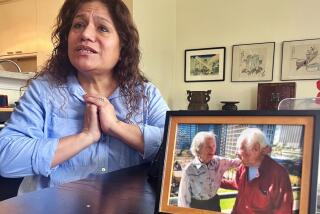Fighting time in rhyme
- Share via
“What a waste it is to lose one’s mind....” -- from Dan Quayle’s attempt to quote the United Negro College Fund slogan in 1989
Ever walk into a room and forget why? Encounter an old acquaintance and fail to dredge up a name? Forget your significant other’s phone number, hold up an express line as you blank out on your ATM PIN, forget birthdays wholesale?
For the record:
12:00 a.m. March 27, 2003 For The Record
Los Angeles Times Thursday March 27, 2003 Home Edition Main News Part A Page 2 National Desk 0 inches; 30 words Type of Material: Correction
Poet W.S. Merwin -- In the “Here and Now” column on poets and poetry in today’s Calendar Weekend, the last name of poet W.S. Merwin was spelled incorrectly as Merwyn.
Welcome to brain cell drain. A sign of incipient mental decrepitude that -- if you’ve reached certain chronological milestones -- can jolt you out of denial. Middle age is no longer just around the corner; it has moved in, unpacked and started rearranging the furniture.
It can happen at any age, a (younger) friend reassured me. It’s stress, information overload, a sign of the times. Besides, said another (younger still), with blithe assurance, “40 is the new 30; 50 is the new 40,” etc., etc.
Uh-huh.
I wasn’t going to succumb without a fight. “Use it or lose it” is the mantra of an expanding volume of baby-boomer-inspired articles about the rejuvenating effect of varied mental gymnastics.
But I’ve been an insatiable reader from age 4. Crossword puzzles are a habit of long standing. I like to draw; I play a couple of musical instruments, not well but enthusiastically.
Clearly, stronger measures were called for.
How about ... poetry? I hadn’t memorized any in years. Could I do it now? I chose Edgar Allan Poe’s “The Raven.” It was indelibly associated in my mind with an old, wickedly satiric Mad magazine treatment, it was long, sing- ably rhythmic, and I’d learned half of it as a kid.
I had it down in a week. I went on to other English Lit staples: Shelley’s “Ozymandias,” Robert Frost’s “The Road Not Taken,” Wordsworth’s “I Wandered Lonely as a Cloud,” two by Emily Dickinson, two by Longfellow. There was no stopping me. I could memorize a poem in two days, then overnight.
But, surprise. My rote exercise was evolving into an odyssey of discovery. A meditation, a respite, a way to pass the time in a grocery line (silently), tune out the tension of traffic snarls, get through some medical unpleasantness. I was learning, late, that the intimate substance of poetry exists in the mind’s eye. Layers of meaning, intriguing and moving resonances began to penetrate my consciousness. The more familiar a poem became, the more I “heard” in it.
I discovered Ezra Pound (“I stood still and was a tree amid the wood ... “), Rupert Brooke (“Down the blue night the unending columns press ... “), Lisel Mueller (“Sometimes, when the light strikes at odd angles ... “), Walter de la Mare (“They told me Pan was dead ... “).
John Donne’s “Death Be Not Proud” was a revelation as Kathleen Chalfant rendered it in Margaret Edson’s drama “Wit.” My brother shared W.S. Merwyn with me; Ted Jacobs, a musician and another latecomer to poetry, who has turned classic poems into beautiful music for children, made me seek out Eugene Field. A PBS documentary turned me on to Stanley Kunitz, who shouted his poems to the sky.
My two cats and well-chosen loved ones are the only recipients of my recitations, though I admit to declaiming in the car, where I convince myself that communing with Shakespeare, Neruda or Poe can look like a hands-free cell call -- not a chat with invisible aliens.
And how has this infinitely rewarding, ongoing experience affected the mental lapses that inspired it?
Um, what did you say your name was?
*
Lynne Heffley can be contacted by e-mail at lynne.heffley@latimes.com.


